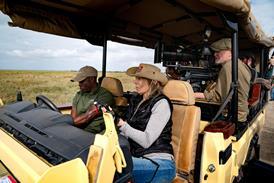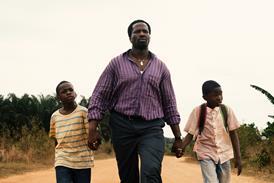Canada
Canada's surfeit of tax and subsidy financing has helped to make it one of the most attractive international destinations for foreign productions. But the country's soft money is not as soft as it once was. Denis Seguin reports
It is not by accident that Canada is the world's leading film production destination: the territory is rich in soft money. The federal government and some provincial authorities offer labour-based tax credits on salaries paid for work performed in the country, while productions can also take advantage of the Film or Video Production Services Tax Credit (Pstc) administered by the Canadian Audio-Visual Certifications Office (Cavco). These combined incentives can reimburse between 2% and 8% of a production's budget, and have proved particularly attractive for Canada's US neighbours, who have the added benefit of being able to save nearly $0.50 on the dollar through the exchange rate.
But Canada is not just an attractive destination for US producers. For international co-productions, the incentives to shoot in Canada are myriad.
On the direct subsidy front, government funding agency Telefilm Canada and some of its provincial counterparts, such as British Columbia's BC Film and Quebec's Societe de Developpement des Entreprises Culturelles (Sodec), will invest in international co-productions as long as they have a Canadian co-producer.
Telefilm can provide up to 49% of the Canadian portion of the production budget, with a maximum investment of $1.6m (c$2.5m). Combined with the various tax credits, productions can cover 20%-30% of their costs with soft money. In 2001, there were 24 Canadian feature film co-productions worth $111m, of which almost $61m came from Canadian participation.
Of course, the system's first priority is to help Canadians. When financing low-budget high-concept comic fantasy Nothing, which wrapped in September, Toronto-based producer Steve Hoban found that the labour-based tax credits provided by the Canadian government and the Ontario authority were equivalent to 16% of the $3m budget, approximately $500,000.
Los Angeles-based Senator Films International has also boarded the project - directed by Vincenzo Natali, the brains behind the 1997 indie sci-fi hit Cube - as international sales agent. The company has all rights except Japan, where the film will be distributed by Klockworx, and Canada, where Alliance Atlantis has distribution rights.
The production team opted not to tap Telefilm for financing, since the agency takes a percentage of international sales revenue. And as Hoban and his partners are certain the film will attract a US distribution deal, "whatever we sell it for in the US will be our profit", he says.
But Canadian soft money is not as soft as it used to be, at least in terms of attracting private Canadian investors. Last year, the government changed the laws governing 'tax-assisted, private sector-structured, filmed-entertainment financing' for Canadians investing in feature film production.
Canadian investors can no longer deduct losses made from funding start-up production partnerships. As a result, several companies engaged in this business are winding down their operations in the country and, in the case of Grosvenor Park, launching new operations in France and Ireland, where there are tax-assisted initiatives.
Founded by Canadian tax attorney Don Starr, the company's business was built by tapping Canadian soft money, creating limited partnerships for investors and taking a service fee. It has financed more than $2.5bn in film and TV production and became a producer in its own right, co-producing such Canada-UK films as David Cronenberg's Spider and Michael Winterbottom's The Claim.
But the new Paris and Dublin offices reflect Grosvenor Park's increasing involvement in films that have no connection with Canada, across a range of budgets from such arthouse films as 24 Hours In The Life Of A Woman, a UK-French-German-Australian co-production, to the $90m US-Irish-UK co-production, Reign Of Fire. So while Grosvenor Park maintains its role as a Canadian production entity, it is no longer involved in structuring limited partnerships in the country. Indeed, according to Martin Katz, president of Grosvenor Park, Canada is in danger of losing its pre-eminent position as a production destination. "For the first time, production in Prague has surpassed production in Montreal," he says.
But if you take Canadian soft money then you will have to take Canada as well, because it is one of the strictest co-production nations in terms of indigenous content. For a film to qualify for Telefilm Canada subsidy, the screenplay has to be written by a writer from Canada or from the co-producing nation(s). This effectively rules out the involvement of a US screenwriter. Whether this qualifies as a creative concession is a subjective consideration best left to producers. But as Katz says, "most co-production partners are anxious to make concessions if they don't have a larger impact".
Soft money recipients
Every film shot in Canada takes advantage of soft money through the labour-based tax credit, including recent UK hit My Little Eye and Michael Winterbottom's The Claim. Others tap the resources of Canada's principal public sector financier, Telefilm Canada.
Recent recipients of Telefilm largesse include Agnieszka Holland's Julie Walking Home, a Canadian-Polish-French co-production which received $470,000; Between Strangers, a Canadian-Italian co-production directed by Eduardo Ponti and starring Ponti's mother, Sophia Loren, which received $725,000; and Canadian-UK co-production Spider, directed by David Cronenberg, which received $940,000.
Canada has official co-production treaties with over 60 countries, not including the US, more than any other country in the world. All a producer needs is a Canadian partner to organise the paperwork.
Between 1996-97 and 2000-01, official co-productions have increased by an annual average rate of 17%. In 2000-01, Canada's major co-production partner was the UK, with $189m, or 57%, of all co-productions. France was second with 27% and Australia a distant third with 8%.
Case study: Stander
Stander is the story of Andre Stander and his gang of fellow bank robbers who, from October 1983 to February 1984, were South Africa's most-wanted men. Although set and shooting in Johannesburg, the $11m film is tapping soft money from Canada and the UK.
The project had been in development for years, but the idea of financing it as a tripartite co-production only came about last year when the UK-based full-service arm of Peter Hoffman's Seven Arts Pictures approached Grosvenor Park to tap the Canadian side of the soft money equation.
To comply with the Cavco's rules on indigenous key creative talent, the director, Bronwyn Hughes (Harriet The Spy), is Canadian, as are two lead actors, Elias Koteas and Deborah Unger, and the editor. In addition, the post-production will be conducted in Canada. Seven Arts' London base allowed it take advantage of the UK's sale-and-leaseback scheme. In exchange, the film features several key UK elements, not least of which is the presence of actor Robert Carlyle. The audio mix and lab work is also being done in the UK.

















No comments yet